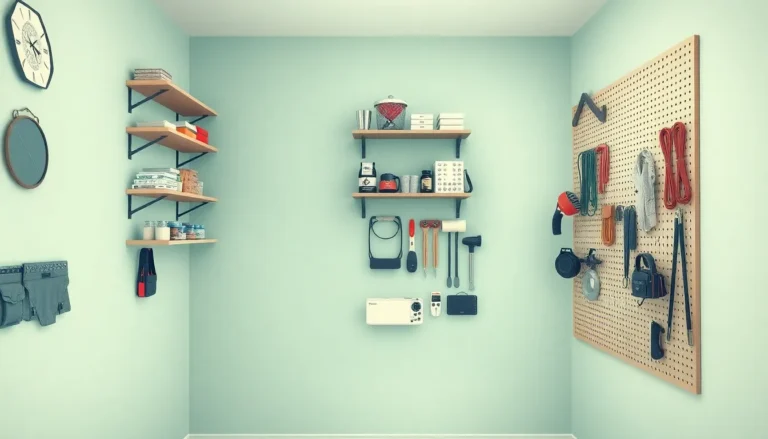Table of Contents
ToggleBuying a home is like dating—everyone wants to impress, but not everyone knows how to put their best foot forward. A solid down payment can make all the difference in securing that dream abode. It’s the secret sauce that can transform a house-hunting nightmare into a smooth sailing adventure.
Understanding Down Payments
A down payment is a key component of the home-buying process. It represents the initial upfront payment made when purchasing a property.
What Is a Down Payment?
A down payment refers to the portion of the purchase price paid in cash upfront. Buyers typically pay a percentage of the total price, which can vary widely depending on the loan type. Conventional loans often require 5% to 20% down, while government-backed loans may allow as low as 3.5%. Understanding this concept helps buyers assess their financial readiness.
Importance of a Down Payment
A substantial down payment can lead to multiple benefits. It reduces the loan amount, ultimately lowering monthly payments. Shorter loan durations may also result from higher down payments, leading to significant interest savings over time. Additionally, a larger down payment can enhance the buyer’s position when negotiating with sellers. A strong down payment often signals financial stability and commitment, fostering a positive impression in competitive housing markets.
Strategies to Maximize Your Down Payment
Maximizing a down payment requires careful planning and dedication. Effective strategies can lead to increased savings and a better position in the home-buying process.
Set a Savings Goal
Setting a clear savings goal is essential. Determine the target down payment amount based on the desired property price. For example, a 20% down payment on a $300,000 home totals $60,000. Knowing the goal helps in creating a tailored savings plan, focusing on both timeframes and amounts. Evaluate current finances and assess how much can be saved monthly. By setting specific milestones, progress can enhance motivation and discipline, leading to quicker achievement of the target.
Automate Your Savings
Automating savings contributes to consistency and discipline. Establish a direct deposit from a paycheck into a designated savings account. This approach ensures money is saved before spending occurs. Consider utilizing high-yield savings accounts for better interest rates, maximizing earnings on savings. Regular contributions become seamless, enhancing the ability to reach saving goals faster. Using budgeting apps can help track progress, encouraging adherence to the plan and promoting income growth for down payments.
Exploring Funding Options
Various funding options exist to help maximize a down payment. Understanding these can significantly impact financial outcomes.
Gifts from Family or Friends
Gifts from family or friends can provide substantial assistance. Many lenders accept these funds, making it critical to document the gift properly. A gift letter from the donor typically confirms no expectation of repayment. This support can significantly boost a buyer’s down payment, impacting the overall loan amount. Buyers should communicate clearly with lenders regarding any gift contributions to streamline the approval process. Such financial help turns dreams into reality by increasing purchasing power.
Down Payment Assistance Programs
Numerous down payment assistance programs aim to ease the financial burden on homebuyers. These programs often provide grants or low-interest loans to eligible individuals. Local and state governments frequently offer such initiatives, targeting first-time buyers or low-to-moderate-income applicants. Research reveals that some organizations allow participants to apply for assistance alongside conventional loans. This aid reduces the upfront costs, making homes more accessible and affordable. Staying informed about available programs enhances a buyer’s position when pursuing a new home.
Making Smart Financial Decisions
Maximizing the down payment requires strategic financial choices. Buyers can achieve their goals by making informed decisions that balance income, expenses, and savings.
Budgeting Wisely
Establishing a strict budget can lead to significant savings. Tracking monthly income and expenses ensures that buyers identify unnecessary spending. Setting specific savings targets linked to the desired property price plays a vital role in financial planning. Allocating a portion of income towards the down payment consistently builds towards that goal. Additionally, utilizing budgeting apps can help maintain focus on savings, making it easier to adjust spending habits as needed. Financial discipline fosters progress and can shorten the time required to reach that down payment objective.
Reducing Debt
Reducing existing debt strengthens overall financial health. High-interest debts, such as credit card balances, can hinder a buyer’s ability to save effectively. Prioritizing debt repayment improves credit scores, which impacts loan eligibility and interest rates positively. Creating a debt repayment plan assists in systematic reductions, allowing buyers to free up more funds for saving. Furthermore, financial advisors recommend avoiding new debts while preparing to buy a home. Staying vigilant about incurred debts can enhance purchasing power, making it easier to achieve that ideal down payment.
Maximizing a down payment is a strategic move that can significantly impact the home-buying journey. By setting clear savings goals and automating contributions buyers can build their down payment more effectively. Utilizing high-yield savings accounts and exploring funding options like gifts or assistance programs can further enhance their financial position.
Smart budgeting and reducing debt play essential roles in this process. By prioritizing these strategies buyers not only improve their chances of securing their dream home but also enjoy better loan terms and lower monthly payments. With dedication and informed decision-making achieving a substantial down payment becomes an attainable goal.







